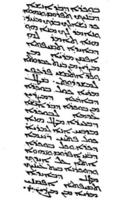At the risk of flogging a very dead horse, there is a very interesting critique of Artscroll by B. Barry Levy that I'd only heard about, but finally read, called "Judge Not a Book By Its Cover", published in Tradition Vol. 19:1, Spring 1981, p.89-95. Now, obviously, it should be borne in mind that this critique is from 1981. 2005-1981=24. That's a pretty long time. However, I think several of his points are still valid, even if Artscroll's projects are done better now and render certain of his criticisms obsolete.
Levy's critique ranges from wishing that Artscroll were something it isn't (i.e., "Artscroll is not modern*....The first volume of the series appeared in 1976, but a recent publication date is no guarantee of being modern. ") to pointing out many errors (i.e., "...what is perhaps most astonishing is the number of plain, old-fashioned mistakes....the Artscroll effort has not achieved a respectable level. There are dozens of cases where prepositions are misunderstood, where verb tenses are not perceived properly and where grammatical or linguistic terms are used incorrectly....These observations, it should be stressed, are not limited to the Bible text but refer to the talmudic, midrashic, targumic, medieval and modern works as well. Rabbinical passages are torn out of their contexts, presented in fragmentary form to enable distortion of their contents).
Levy asks "How these errors have managed to escape the eyes of the many sages whose approbations adorn the volumes may seem somewhat puzzling, but again, it is the presentation of these letters - the Madison Avenue blitz - which makes these documents what they are . Anyone who reads these "approbations"...will see that the rabbis who wrote the letters did not read the commentaries themselves. These letters are more like personal good wishes, character references and the like than testimonies to the work's accomplishments."
That is to say, they are haskamos. Again, wishing something is something that it isn't.
His critique about Artscroll not being "modern" is, frankly, like a critique of Judaism for not being Christian. Artscroll is a Chareidi publishing house (for lack of a better term).
But he raises good points. He notes that "the use of manuscripts on the dustjackets points to some value to be derived from the "human sciences" but careful study of the work shows that the manuscripts never made it past the covers. Frequent citations of inaccurate versions of talmudic, targumic and medieval texts make it clear that vulgar texts have been preferred to critical ones. Artscroll has thus relied on, popularized and to some extent even sanctified certain errors in its desire to avoid being scientific.....Artscroll is making the claim that nothing of value for understanding the Bible is to be found outside the sources which it has used**. "
Further, Levy writes that "Conspicuous by their absence are names like J. B. Soloveitchik, A. J. Heschel. M. Buber, N. Leibowitz, U. Cassuto, A. I. Kook, and M. Schneerson. It is clear that no moderns of suspected heterodox tendencies have been cited, but it would have been useful if Artscroll has defined the criteria for exclusion, as other less desirable figures are cited with approval: e.g. Josephus and Yefet ben Ali, the Karaite."
Come to think of it, in the Artscroll tashlich*** there is a commentary note that quotes the Chovos Ha-levavos quoting (but not attributing)....the Islamic Hadith. (My observation, not Levy's).
Regarding Josephus, Artscroll cites his citation of Berosus, a Babylonian priest born around 350 B.C.E., whose historical writings included an adaptation of the Mesopotamian flood legends. Levy asks, "If Berosus' analysis of the Atra-hasis legend is admissible, why is Cassuto's work on other Mesopotamian texts ignored?"
Finally, Levy accuses Artscroll of essentially plagiarizing material from the Encyclopedia Judaica, modified at times and mentions numerous simple errors, mistranslations, distortions and the like. A lot of ink has been spilled and a lot of electrons have been moved noting these. I don't for sure, but I bet that in a quarter century Artscroll has greatly reduced the number of simple errors and that the quality of scholarship has gone up, although it is also possible that it has gotten errors of the distortion variety down to a science, while Artscroll " presents itself as a 'a Chazal's eye view' of the Bible'".
Anyway....Artscroll is an easy target, and one that probably takes more heat than it really deserves. Partly it is a victim of its own success, but in the main Levy subjects it to fair criticism, even if he is plainly wrong about Artscroll having to be something it simply doesn't want to be.
*Here he means that it rejects all modern scholarship. "Modern Bible study differs from classical study primarily in its attempts to visualize the characters and messages of Scripture in their ancient contexts rather than in their contemporary ones."
**The sources are: "Talmud, the midrashim and the best known medieval and modern commentators: Rashi, Ibn Ezra, Radak, Ramban, Abarbanel, Malbim, Hirsch,. Additional material is culled from the targumim, the medieval philosophers, the medieval philologists, and more than a few important exegetical works which are relatively unknown and worthy of consideration. A large sampling of mussar and hasidic thought rounds out the selection and has, in many ways, shaped the series."
***Pg. 643 of the Rosh Hashana machzor cites the Chovos Ha-levavos' citation of the famous distinction between the lesser jihad (war) and the greater jihad (internal war with oneself).





